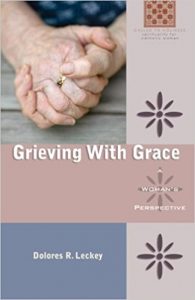Grieving With Grace: A Woman’s Perspective
 A few months after her husband’s death, Dolores Leckey went to dinner with a small group of women, all of whom, except one, were single. “I noticed how I still feel very married,” she wrote afterward in her journal. She added, “At some point in a long marriage we become aware of something like fusion.”
A few months after her husband’s death, Dolores Leckey went to dinner with a small group of women, all of whom, except one, were single. “I noticed how I still feel very married,” she wrote afterward in her journal. She added, “At some point in a long marriage we become aware of something like fusion.”
Leckey’s husband, Tom, died June 23, 2003. At the end of that summer, she began to keep the journal that she shares with readers in “Grieving With Grace.” Covering one year, September 2003 to September 2004, her journal indeed is about grief, as the book’s title suggests — about the death of a spouse, “the person with whom all the rhythms of daily living have been shared, at all levels: body, mind and soul.”
Her journal also reveals the steps Leckey slowly took as the month’s unfolded after Tom’s death to begin a journey in life apart from him. She writes of praying “to understand what I truly desired” and says that in the answer that came she learned that she simply should “be open to whatever the future holds.”
On March 25, 2004, Leckey wrote in her journal: “It seems to me that a loss can be a form of annunciation with the possibility — no, probability — of new life. That can happen in large and small ways.”
So this is a book about grieving; about Tom Leckey; about a marriage; about change and new life; about women. It is the story of a journey undertaken after a spouse’s death, a journey, however, viewed in light of the couple’s long journey together over the course of many years.
At times, the book becomes a meditation on marriage. “There is nothing like touching, holding, embracing a beloved person. To touch is human. It connects us,” she writes. Telling of Tom’s efforts in later life to promote affordable housing, she says, “His concern that everyone have a decent, safe place to live grew out of his own love of home, a concept and a concrete reality of ultimate meaning to him.”
What is a marriage? Leckey tells in her concluding thoughts of missing “the intimacy of marriage in its many dimensions: conversations, silence, the pleasure of closeness, the sharing of space, intellectual stimulation, the daily rituals of dinner and bedtime and awakening.”
How does a marriage work? The picture Leckey paints is one many readers will recognize readily. She says: “While we shared a common ground of values and interests, we had our differences. But with the passage of years and the gift of memory, we came to know that we would get through the rough patches. We also realized that intimacy tends to be cyclical: a coming together and a moving apart. Once that was learned, the cycle seemed friendly.”
The memories of her marriage that Leckey shares in numerous journal entries are particularly moving:
Oct. 9, 2003: She recalls the time she met Tom — at an opera party March 25, 1954, where people listened to a recording of Verdi’s “La Traviata.” She writes, “During our marriage we would listen to it once a year, usually on March 25.”
Nov. 29, 2003: Leckey tells of a visit to St. Patrick’s Cathedral in New York. She writes, “I looked to my right and saw the statue of the Pieta where Tom said he knelt in prayer before our wedding began, asking for the grace to be a good husband. He was 23 years old.”
Dec. 14, 2003: On the feast of St. John of the Cross, Leckey recalls how, “in his last years, Tom would quote the Carmelite saint: ‘In the evening of life only love matters.’”
Leckey’s journal weaves valuable theological insights together with a prayerful spirituality in a manner that is pertinent to every searcher’s quest. This well-written book makes for fine reading as Leckey candidly tells how she coped with her husband’s death in the time until she was able to write these words of Sept. 12, 2004:
“A major breakthrough was recognizing that I’ve been clinging to the image of my ‘broken heart’ much like a badge of honor. It’s time to let it go. This does not mean giving up the remembrance of Tom; the living must keep memory alive. But right now I feel that I am very much alive. God told me so in different ways.”
About the reviewer
David Gibson served for more than 37 years on the Catholic News Service editorial staff.
Disclaimer: Book reviews do not imply and are not to be used as official endorsement by the USCCB of the work or those associated with the work. Book reviews are solely intended as a resource regarding publications that might be of interest to For Your Marriage visitors.




